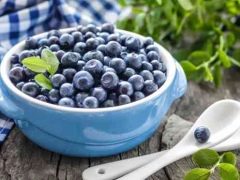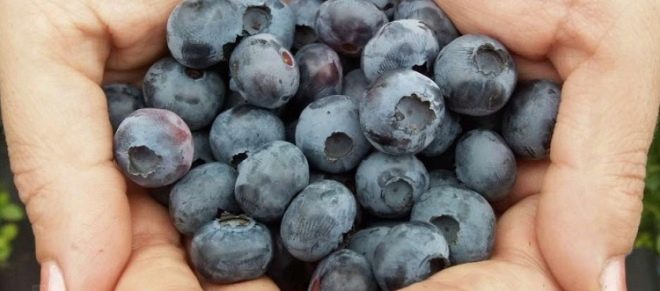At what age can blueberries be given to children?
Blueberries are rightly considered not only delicious, and medicinal berries, because its composition is unique. But it is precisely this fact that instills in parents a healthy share of doubts about how old a child can be given it without the risk of undesirable consequences. In this article we will tell you when it is possible to introduce a berry into the diet of a child, and also about the form in which it is best to give it to children.
Benefit
Blueberry berry is 90% water, the remaining 10% are vitamins, which are present in it quite a lot: this is vitamin C, necessary for the immunity of the child, and vitamin A, which is necessary for the formation of vision, and vitamins of group B, without which nervous the human system cannot function normally.
Useful properties of blueberry have long been seen by doctors, it is widely used in official and traditional medicine. Special coloring pigment gives the berry blue color. A set of fruit acids promotes tissue regeneration, increases the tone of the blood vessel walls. Blueberries promotes better nutrition of the brain, improves memory, increases learning ability, and normalizes the gastrointestinal tract.
Contraindications
Blueberries should not be given to children with congenital heart defects and blood diseases. The composition of the berry increases blood viscosity, increases its ability to coagulate. Therefore, blueberry is not recommended for children with hemostasis problems.
If a child has diseases of the digestive system, in particular gastritis with high acidity, blueberries should also be eliminated or severely limited - berries contain a fairly large amount of acids (oxalic, malic, etc.).
Berry is not recommended for children with biliary dyskinesia. Blueberry is also given with care to children with kidney pathologies, since it contains oxalic acid, which can provoke salt deposition in the urinary system.
Age restrictions
Often parents can come across tips on the possibility of introducing this berry into complementary foods for children from six months. In fact, pediatricians caution against such an early acquaintance of the child with such a complex berry. It can cause the development of food allergies, as well as cause disruption of the digestive organs. A baby’s set of essential vitamins can be provided by simpler apples and vegetable purees. The best to start feeding blueberries is the age of 1 year.
But even from year to year a child can be given these berries only when the baby does not have a propensity for allergies at all. Atopic dermatitis, problems with the tolerability of new products - a good reason to wait a little with blueberries until 3 years of age.
The best adviser for the mother in this matter is her own common sense, which strongly recommends carefully weighing the possible harm and the expected benefits of each product for the baby’s body.
amount
Children from year to year blueberry give in small quantities - adding a few stuffed berries in a mashed form in fruit puree, for example, in apple or peach. From 3 years old, a child is recommended not more than a tablespoon of blueberry berries at a time, and from 5 years old - one handful. Even if the child does not have an allergy to this berry, do not exceed the recommended amount in order to avoid unpleasant consequences for his health and well-being.
Even in adolescence, eating blueberries is often the cause of intoxication, manifested by dizziness, nausea, vomiting, and disruption of stool consistency.
How to give and for what?
In prikorm lagoda introduced exclusively in the shabby form, mixing with fruit puree. Later, you can add grated fruit in whole or porridge, mousse, cottage cheese, puddings. Children love homemade pastries with blueberries - the berries are very tasty in the composition of muffins.
You can make compote from blueberry to your child, make fruit drink during an illness associated with high fever. Mashed blueberries without sugar are used for compresses for some skin ailments, for example, for lichen.
Tea with the addition of dried blueberries helps with diarrhea, bloating, and is also used for cystitis, which in childhood is quite common. Water infusion of dried blueberries is recommended to gargle during sore throat and mouth during stomatitis.
Choosing berries for a child, beware of buying them on the market, because no one knows where they were collected or how they were stored. True lovers of blueberries in northern latitudes prefer to collect it themselves.
How to distinguish from blueberries?
Blueberries are known to mankind for a long time, but it is constantly confused with blueberries. Unlike blueberries, the pulp of the berry is green, and after eating, the mouth, lips and tongue do not turn black or blue, they retain their naturalness.
Blueberry flavor somewhat inferior to blueberries. Blueberries are known to be sweeter. But the taste of blueberry is more delicate, neutral, and therefore children treat it with great sympathy.
In the next video, you will find 10 rules of complementary foods from Dr. Komarovsky.

































































